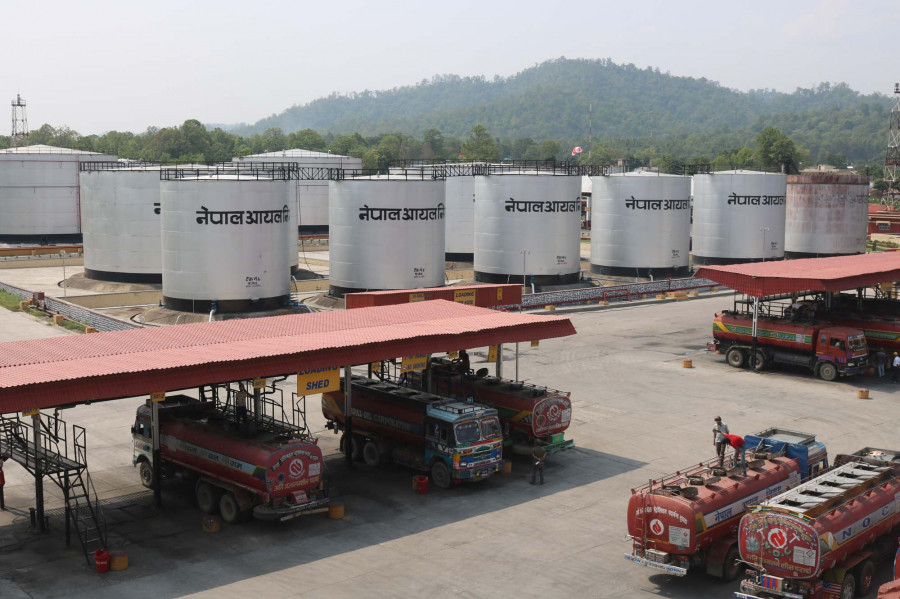Money
Fuel consumption down 80 percent in April with economy in suspension
Officials said sales of all petroleum products except cooking gas dried up.
Sangam Prasain
Fuel consumption saw an 80 percent drop in April with the entire population confined to their homes and the economy in suspension. Officials said sales of all petroleum products except cooking gas dried up as the virus lockdown took hold.
"Petrol, diesel and aviation fuel sales all crashed in April. The entire month's turnover was equal to what we used to see in three days in normal times," said Binitmani Upadhyay, spokesperson for Nepal Oil Corporation. "Overall sales have plunged by more than 80 percent," he said.
Business began to stir on Sunday after certain economic activities were unshackled, and several offices in Kathmandu Valley reopened. "We expect to see fuel demand pick up from this week, but it will be a gradual rise," he said.
The virus slashed fuel imports worth Rs14 billion as tens of thousands of motor vehicles stayed off the roads and factories remain shuttered, resulting in a visible improvement in air quality.
The statistics of the Department of Customs show that the country imported petrol, diesel, liquefied petroleum gas, aviation fuel, kerosene, fuel oil and lubricating oil worth Rs214.48 billion in the last fiscal year that ended mid-July 2019.
Oil imports accounted for 15.2 percent of the country’s total import bill of Rs1.41 trillion in fiscal 2018-19.
While the government lost millions in tax revenue after gasoline imports plunged due to the closure, environmentalists said air quality got better nationwide.
Fuel demand is likely to swell further as more areas are expected to be reopen next week, according to officials.
Nepal Oil Corporation sold 9,000 kilolitres of petrol in April while it used to ordinarily sell 90,000 kilolitres monthly. Diesel sales too plunged to 30,000 kilolitres in April from the usual 240,000 kilolitres monthly.
Sales of aviation fuel collapsed by around 90 percent with only a few rescue flights taking off in April.
Upadhyay said that cooking gas sales dropped to 35,000 tonnes in April from 45,000 tonnes normally.
"The slow sales show that people stocked up on cooking gas as the government was preparing to impose a lockdown in March." He said that gasoline sales may bounce back, but demand for cooking gas would likely remain subdued in May too.
Nepal announced a lockdown beginning on March 24. All flights were suspended, vehicles went off the roads, and cargo movement stopped as most people were asked to stay home to prevent the possible spread of the coronavirus even as the pandemic raged across the world.
The lockdown has been extended till May 18. Last Wednesday, the cabinet decided to allow cargo trucks to operate, and farmers and industries in rural areas to resume operations in a bid to prevent the economy from coming to a dead stop.
With sales down to almost nil, the country's fuel monopoly has missed out on profits from the collapse in global oil prices.
Prices plunged below zero for the first time on April 20 as demand for energy evaporated across the globe amid the coronavirus pandemic, and traders sought to avoid owning crude for lack of storage space.
But prices gradually recovered, crude reached $30 per barrel on Sunday.
According to Upadhyay, Nepal Oil Corporation's profit on a litre of petrol stands at Rs22 and the profit on a litre of diesel comes to Rs25, based on the May 1 price list sent by its sole supplier Indian Oil Corporation.
The state-owned company makes a profit of Rs33 and Rs84 per litre of aviation fuel sold to domestic and international airlines respectively.
"Overall, the monthly estimated profit from fuel sales stands at Rs1 billion," said Upadhyay. "But we have not been able to reap the benefit of record low fuel prices."
According to him, the corporation is enjoying a profit from the sales of cooking gas for the first time in many years. It makes a profit of Rs160 on every cylinder of cooking gas sold.




 9.7°C Kathmandu
9.7°C Kathmandu















